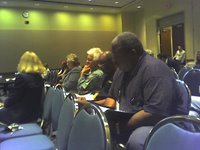
In the Chicago airport - returning from the CNU conference in Providence, RI. One of the highlights was to be able to spend lots of time with the CCDA folks including John Perkins, Philip Perkins and Mary Nelson. We had a great time scheming, eating, chatting... The photo is of Philip and John Perkins and Mary Nelson. We attended a workshop together.
Regarding the congress - have a lot to say about the experience. First off, thanks to a generous donation of a donor through CCDA I was able to go. It's always good to be exposed to new thoughts and ideas. Providence is a great city - old, historic. I love the East Coast. The CNU is a group of city planners, architects and non profit and for profit developers that are interested in transforming the city into a place that is livable in form and function. It's a response to urban sprawl and unchecked development. It's in many ways a return to looking at the city as an important resource. It call for mixed-use, mixed income development around transportation hubs. Walkable neighborhoods and the development of true neighborhoods and communities are a high value.
Topics were covered that were as diverse as city codes to the end of the oil industry. One especially interesting workshop I attended was around school segregation based on housing choice. Essentially, the speaker was contending that we essentially segregate our schools based on housing affordability. He (as a liberal) was advocating for school vouches as a vehicle to bring equity and solve inner city school problems. Check out Dr. Thomas Nechyba's info and research here. Interesting stuff. We've lived this issue with Samuel.
For me, I went with one thing in mind (and I suspect the other CCDAers did also) - to look at CNU principles in light of gentrification and the redevelopment that has been going on in our communities. It's a little premature for me to write at length about this issue right now. I have a lot to think about. What I can say is that it's almost inevitable that our communities will gentrify and we will have to figure out how those of us doing community development will respond. Bob Lupton coined a phrase recently, "Gentrification with Justice." He contends that a certain amount of gentrification must occur to bring resources into our community. Perhaps the CNU principles will help us bring justice to this issue?
I'm ready to go home... The plane boards soon... Keep praying for me!
Comments
Post a Comment